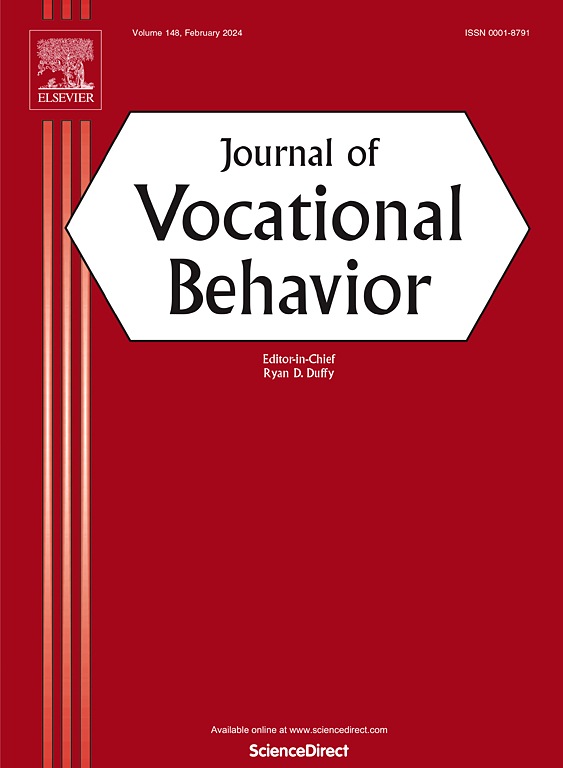当新人的声音被认可(不认可):组织社会化的调节作用
IF 5.2
1区 心理学
Q1 PSYCHOLOGY, APPLIED
引用次数: 0
摘要
在进入一个组织后,新人的目标是减少不确定性,并经常通过适应组织现状来实现这一目标。在本文中,我们认为,这些努力调整和适应可以,矛盾的是,使新来者脱颖而出。我们专注于让新人脱颖而出的具体方式——建设性地挑战组织现状。尽管这种以挑战为导向的行为有潜在的风险,因为它可能会与现任者对抗,但它为那些寻求新想法和新视角的组织带来了巨大的希望,而许多现任者可能已经对现状视而不见。具体来说,我们调查了新员工的建言行为——具有挑战性但建设性的想法、建议和关注的向上沟通——以及主管是否以及何时认可这些输入。根据语义制造理论,我们认为主管对声音的认可主要取决于新员工的组织社会化,因为这使他们能够以与现任员工产生共鸣的方式交流想法、建议和关注。我们使用匹配的主管-新人数据(即108对)来测试我们的模型,区分促进(建议导向)和禁止(问题导向)的声音。我们发现,主管通常会接受新员工的提示性声音,但往往不认可适应能力较差的新员工提出的以问题为重点的声音。总的来说,我们的研究为组织社会化和新人声音认可提供了新颖的、理论驱动的见解,提醒组织不要拒绝可能难以理解的新人输入。本文章由计算机程序翻译,如有差异,请以英文原文为准。
When newcomer voice is (not) endorsed: The moderating effect of organizational socialization
Upon entering an organization, newcomers aim to reduce uncertainty, and often do so by adjusting to the organizational status quo. In this paper, we argue that these efforts to adjust and fit in can, paradoxically, enable newcomers to stand out. We focus on a specific way in which newcomers can stand out—by constructively challenging the organizational status quo. Although such challenge-oriented behavior is potentially risky, as it may antagonize incumbents, it holds great promise for organizations seeking new ideas and fresh perspectives on a status quo that many incumbents may have become blind to. Specifically, we investigate newcomer voice behavior—the upward communication of challenging but constructive ideas, suggestions, and concerns—and whether and when supervisors endorse such input. Informed by sensemaking theory, we argue that supervisor endorsement of voice critically depends on the organizational socialization of newcomers as this enables them to communicate ideas, suggestions, and concerns in ways that resonate with incumbents. We test our model using matched supervisor-newcomer data (i.e., 108 dyads), distinguishing between promotive (suggestion-oriented) and prohibitive (problem-focused) voice. We find that supervisors are generally receptive to newcomer promotive voice but tend to not endorse problem-focused voice from less-adjusted newcomers. Overall, our research provides novel, theory-driven insights into organizational socialization and newcomer voice endorsement, cautioning organizations against rejecting newcomer input that may be difficult to make sense of.
求助全文
通过发布文献求助,成功后即可免费获取论文全文。
去求助
来源期刊

Journal of Vocational Behavior
PSYCHOLOGY, APPLIED-
CiteScore
13.10
自引率
5.40%
发文量
85
期刊介绍:
The Journal of Vocational Behavior publishes original empirical and theoretical articles offering unique insights into the realms of career choice, career development, and work adjustment across the lifespan. These contributions are not only valuable for academic exploration but also find applications in counseling and career development programs across diverse sectors such as colleges, universities, business, industry, government, and the military.
The primary focus of the journal centers on individual decision-making regarding work and careers, prioritizing investigations into personal career choices rather than organizational or employer-level variables. Example topics encompass a broad range, from initial career choices (e.g., choice of major, initial work or organization selection, organizational attraction) to the development of a career, work transitions, work-family management, and attitudes within the workplace (such as work commitment, multiple role management, and turnover).
 求助内容:
求助内容: 应助结果提醒方式:
应助结果提醒方式:


